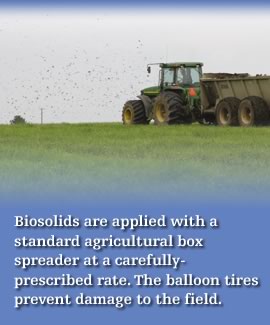

Do biosolids affect water quality?
What about pathogens and heavy metals?
Will the value of my property be adversely affected if biosolids are used in my neighborhood?
How do biosolids benefit all Virginians?
Who regulates biosolids?
Biosolids are regulated at both the federal and state level. The federal rules for biosolids are provided in 40 CFR Part 503. Biosolids must first meet several quality standards and regulations in order for them to be applied to land. These standards contain limits for metals that may exist in biosolids, site rules and regulations, pathogen standards, record keeping rules and soil monitoring requirements. In Virginia, the Virginia Department of Environmental Quality has the primary responsibility for permitting and monitoring the land application of biosolids.
back to top
Do biosolids affect water quality?
One benefit of biosolids is that about 95% of the nitrogen in biosolids exists in an organic form that has a slow release rate, which makes it much less likely to run off into streams. Virginia regulations require buffers between the biosolids application site and wells, creeks, rivers, lakes, drainage ditches or intermittent streams.
back to top
How are biosolids generated?
Wastewater treatment facilities monitor incoming wastewater streams to ensure their recyclability and compatibility with the treatment plant process. Once the wastewater reaches the plant, the sewage goes through physical, chemical and biological processes that clean the wastewater and remove solids. In most cases, the solids are then processed in a digester for a prescribed number of days to accelerate the natural bacterial destruction of pathogens. Biosolids may also be treated with lime to raise the pH level to reduce objectionable odors and further destroy pathogens.
back to top
Do biosolids smell?
Some biosolids may have a slight musty, ammonia odor, while other biosolids may have a stronger odor that may be offensive to some people. The odor is caused by compounds containing sulfur and ammonia, both of which are plant nutrients. When biosolids are applied properly, the odor should be minimal and dissipate quickly.
back to top
Why do we have biosolids?
Biosolids are a by-product of the municipal wastewater treatment process. Water treatment technology has made our water safer in recent years. Through federal and state regulation, local governments are required to treat wastewater and to make the decision whether to recycle biosolids as fertilizer, incinerate them, or bury them in a landfill. Recycling biosolids as a fertilizer is the most environmentally responsible solution.
back to top
What about pathogens and heavy metals?
Biosolids applied on Virginia farmland must be certified by the generating wastewater treatment facility as meeting EPA's rigorous standards for pathogens (disease-causing organisms) and heavy metals. While heavy metals were once a concern in municipal wastewater, federal regulations now require industries to pre-treat their effluent and remove heavy metals before discharging into the sewage system. As a result, the amount of heavy metals in biosolids is but a small fraction of the allowable EPA levels. Once biosolids are applied to the land, the combination of sunlight, air and rain provides a hostile environment for any remaining pathogens, which are quickly destroyed. Farmers are required to keep any farm animals off the fields for 30 days, primarily to prevent them from consuming the nitrogen, a reasonable precaution with any fertilizer.
back to top
Will the value of my property be adversely affected if biosolids are used in my neighborhood?
No. Studies have shown that biosolids are beneficial. By using biosolids, farmers are managing the nutrients and nutrient applications on their properties more carefully and responsibly than the average landowner. In addition, those who use biosolids are benefiting from a more efficient fertilizer option, thus helping their farm fields or other open lands be more productive. The more profitable their operations are, the more likely it is that farmers will keep their properties in production, enhancing their value and preserving the agricultural character of their communities.
back to top
How do biosolids benefit all Virginians?
The irreplaceable land that produces our food and fiber and provides us with scenic open space, wildlife habitat and clean water is increasingly at risk from urban sprawl and rural subdivisions. To ensure a prosperous future, we must save our farmland. Privately owned open lands generate more in tax revenues than they require back in municipal services. Pastoral landscapes attract tourists. Agriculture contributes to state economies directly through jobs, sales and support services, and by supplying lucrative secondary markets such as food processing. Saving farmland is an investment in community infrastructure.
Through the land application of biosolids, farmers can save thousands of dollars a year, depending on the amount of land utilized. The more profit a farmer achieves through agriculture, the more likely the land will continue to be farmed.
back to top
![]()
Home | What are Biosolids | Benefit to Agriculture | Biosolids FAQ | For More Information
©2004 NutriBlend, Inc.